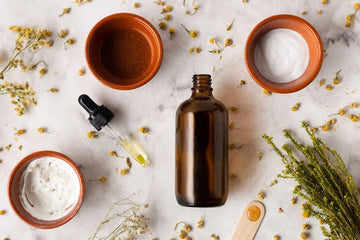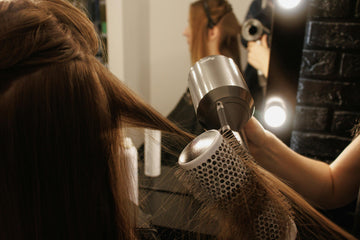Explore how these natural oils can transform your hair care routine
Essential oils are mighty helpers for soothing stress and are a natural pick-me-up for energy or even easing you into dreamland. Seriously—their applications are practically limitless.
While there's a wide variety of oils you can use for your wellbeing, a select few stand out as the best essential oils for hair for their exceptional ability to transform your strands.
These powerful, plant-sourced oils offer benefits for a range of hair types and issues, such as stimulating hair growth, maintaining scalp health, boosting thickness, and imparting a silky shine. Each oil has unique properties that can promote the health and look of your hair.
Rather than relying on costly products that claim to promote growth but contain a lengthy list of unpronounceable (and sometimes questionable) ingredients, you can unlock the secrets to naturally long, Rapunzel-like hair.
Ahead, find the top seven essential oils that excel in hair care, plus advice on how to use them effectively and safely for crafting your own hair care routine specifically suited for your hair type and needs, along with valuable insights and solutions.
Understanding essential oils for hair
Essential oils are concentrated plant extracts obtained through distillation or cold pressing. They are nature's essence, capturing the plant's scent, flavor, and therapeutic properties. Unlike other hair care products that might contain a mix of synthetic ingredients, essential oils are purely natural, so you can breathe easy knowing what you’re using is straight from mother nature’s apothecary.
When it comes to natural options, essential oils are like a dream team for hair care––penetrating deep into the scalp and hair follicles, providing nourishment, and promoting healthy hair growth. Some oils, like lavender and rosemary, stimulate hair growth by enhancing blood circulation to the scalp. Others, like tea tree oil, possess antimicrobial properties (you’ve likely seen this star in natural acne solutions), effectively battling dandruff and scalp infections.
What sets essential oils apart from conventional hair care products is their potency and purity—a little goes a long way, and they can be tailored to meet your precise hair needs and concerns. If you lean toward the clean, green type, you’ll be glad to know EOs are free from harsh chemicals and artificial fragrances for more gentle yet effective hair health.
EOs are also super versatile, so you can easily incorporate them into your current hair care routine, adding a few drops to your fave shampoo and conditioner, or if you’re a DIY-Queen, add them to a custom-made hair mask.
How to use essential oils for hair

If you’re convinced that essential oils are worth a try, using them for hair care means you’ll have to brush up on their potency and learn the importance of proper dilution. Directly applying pure essential oils can be too intense and can lead to irritation. But don’t worry, all you need to do is learn how to dilute them with a fatty carrier oil—like coconut, olive, or jojoba oil—which not only reduces the concentration but also levels up essential oils’ ability to penetrate and nourish the hair and scalp. Win-win.
A general guideline for dilution is to mix a few drops of essential oil with a larger amount of carrier oil. For instance, adding 2-3 drops of essential oil to a tablespoon of carrier oil is usually a safe ratio. You can then massage the mixture into your scalp, apply it along your hair strands, or add it to your everyday hair care products.
Safety is a major must when using essential oils, so always conduct a patch test before full application to check for any allergic reactions. How to: Apply a small amount of the diluted oil to your inner arm and wait 24 hours to see if any irritation occurs. If you experience no adverse reaction, it's safe to use the oil on your scalp and hair.
The 7 best essential oils for hair
While a ton of superstar oils can work wonders, the best essential oils for hair are particularly coveted for their elite-level abilities, from enhancing growth to improving scalp health. Let's explore the top seven essential oils that can transition your tresses from brittle and bland to bouncy and brilliant.
Lavender oil—growth and scalp health
Lavender oil is renowned for its soothing fragrance and therapeutic properties.
Benefits:
- Promotes hair growth
- Reduces stress-related hair loss
- Antimicrobial properties improve scalp health
How to use:
Dilute with a carrier oil and massage into the scalp; can be added to shampoos.
Caution:
Use in moderation to avoid skin irritation; always perform a patch test.
Rosemary oil—thickness and growth
A stimulating oil with a refreshing herbal scent.
Benefits:
- Enhances hair thickness
- Stimulates hair growth
- May delay hair graying
How to use:
Mix with a carrier oil for scalp massage; suitable for hair masks.
Caution:
Not recommended for pregnant women, individuals with high blood pressure, or epilepsy.
Peppermint oil—circulation and growth
Known for its invigorating and cooling effects.
Benefits:
- Boosts scalp circulation
- Promotes hair growth
- Creates a cooling sensation
How to use:
Dilute with a carrier oil and apply to the scalp for a refreshing feel.
Caution:
High concentrations can cause irritation; avoid undiluted application and eye contact.
Tea tree oil—scalp cleansing and dandruff control
A potent oil known for its cleansing properties.
Benefits:
- Deeply cleanses the scalp
- Controls dandruff
- Has antifungal and antibacterial qualities
How to use:
Mix a few drops with shampoo or a carrier oil, apply to the scalp, and massage gently.
Caution:
Can be overly drying if used excessively; always dilute, and avoid direct contact with eyes.
Ylang ylang—restoring and repairing
Known for its gorgeous scent and natural oil-balancing properties.
Benefits:
- Stimulates the sebaceous glands for natural oil production
- Activates hair follicles to encourage hair growth
- Enhances hair texture and minimizes breakage and split ends
How to use:
Combine five drops of ylang-ylang oil with a carrier oil such as olive or coconut oil, and gently warm it. Apply mixture to hair, massaging into scalp, and let sit for 30 minutes. Rinse and cleanse with shampoo.
Cautions:
Avoid ylang-ylang if you are pregnant or breastfeeding, and watch for any potential allergic reactions.
Chamomile oil—shine and soothing scalp
Renowned for its calming and soothing properties.
Benefits:
- Enhances natural hair shine
- Soothes irritated scalp
- Lightens hair naturally
How to use:
Add a few drops to a carrier oil or your conditioner and apply to hair. For a natural lightening effect, mix with water and spray on hair before sun exposure.
Caution:
Conduct a patch test to ensure no allergic reactions, especially for those with pollen allergies.
Cedarwood oil—hair loss and balance oil production
A woodsy-scented oil known for its balancing properties.
Benefits:
- Reduces hair loss
- Balances scalp oil production
- Stimulates hair follicles
How to use:
Blend with a carrier oil and massage into the scalp, or add a few drops to your shampoo.
Caution:
Avoid use if pregnant or suffering from severe allergies; always dilute properly.
DIY hair care recipes using essential oils

|
Moisture Boost Mask for Dry Hair |
Growth-Stimulating Scalp Treatment |
Anti-Dandruff Scalp Soother |
|
3 tablespoons of coconut oil, 5 drops of argan oil, 2 drops of lavender oil. |
2 tablespoons of jojoba oil, 3 drops of rosemary oil, 2 drops of peppermint oil. |
2 tablespoons of olive oil, 3 drops of tea tree oil, 2 drops of cedarwood oil. |
|
Gently heat the coconut oil until it melts. Mix in the argan and lavender oils. Apply to hair, leave for 30 minutes, then shampoo out. |
Mix the oils together. Massage into the scalp for 5 minutes before bedtime. Leave overnight, then wash out in the morning. |
Blend the oils. Apply to the scalp, leave for 20-30 minutes, then shampoo out. |
|
Deeply moisturizes hair Soothes the scalp Adds shine |
Stimulates hair growth Improves scalp health Refreshes and invigorates |
Reduces dandruff and scalp irritation Balances scalp oil production Strengthens hair follicles |
How to choose the best essential oils for hair
Although natural, not all essential oils for hair care are made with the same care and quality. For the best results, look for high-quality, pure, and organic options. Pure essential oils are more effective and less likely to cause irritation, while organic oils ensure that the product is free from certain harmful pesticides. Responsibly sourced oils guarantee that the product is environmentally sustainable and ethically produced.
Consider whichever of these particular factors are important to you, and do your research by reading labels and choosing reputable brands that will lead to better results and safer experiences.
Embrace natural hair wellness with essential oils
Essential oils offer an alternative, natural approach to addressing pesky hair problems like frizz, dullness, and lackluster volume. Potent compounds locked away in these plants are coaxed out and bottled up so you can put them to work, enhancing growth, soothing your scalp, and providing nutrients for hair vitality. Have fun experimenting with these oils and DIY recipes, adjusting them to your specific hair needs, scent preferences, and what you have on hand.
For more insights into natural hair care and high-quality products, browse TYME’s website to discover a world where hair health is nurtured by the best of nature.






